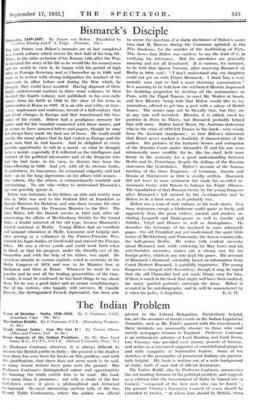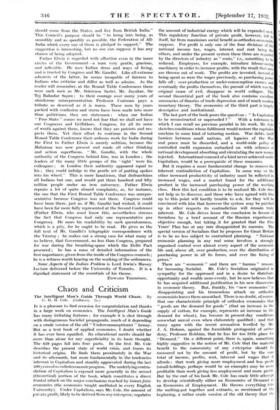The Indian Problem
Years of Destiny : India, 1926-1932. By J. Coatman, C.I.E. (Jonathan Cape. 10s. 6d.) Truth About India : Can We Get It ? By Verrier Elwin. (Allen and Unwin, Ltd. 2s. 6d.) Some Aspects of the Indian Problem. By Rt. Hon. Lord Irwin, K.G., G.C.S.I., G.C.I.E. (Oxford University Prese. Is.) As Professor Coatman observes, it is always difficult to interest the British public in India ; the present is the deadest time there has ever been for books on this problem, and with this justification, that there does not seem much to be said, so many recent writers have gone over the ground. But Professor Coatman's distinguished career and opportunities for learning the truth entitle him to be read. His book does more than it promises ; not only a study of the last half-dozen years, it gives a philosophical and historical background. Its most interesting section tells of the two Round Table Conferences, where the author was official advisor to the Liberal Delegation. Particularly helpful, too, are the accounts of recent events in the Indian Legislative Assembly, such as Mr. Patel's quarrel with the Government ; these incidents are necessarily obscure to those who read merely newspaper resumes in England. Professor Coatman is an enthusiastic admirer of Lord Reading and Lord Irwin, two Viceroys who presided over stormy periods of history, and writes as a convinced supporter of constitutional progress and with sympathy of Nationalist leaders. Some of his sketches of the personality of prominent Indians are particu- larly helpful. His book is written out of a wide background of study, both of men and of official documents.
The Indian Riddle, also by Professor Coatman, summarizes the outstanding features of the political problem, and suggests as a solution that the Government of India be turned into a Council " composed of the best men who can be found " ; the present Viceroy's Executive Council of seven should be extended to twelve, " of whom four should be British, threo should come from the States, and five from British India." This Council's purpose should be " to bring into being, as smoothly and as speedily as possible, the Federation of All- India which every one of them is pledged to support." The suggestion is interesting, but no one can suppose it has any chance of being adopted.
Father Elwin is regarded with affection even in the inner circles of the Government—a man very gentle, gracious, and inflexible. He uses Indian dress and ways of living, and is trusted by Congress and Mr. Gandhi. Like all extreme" admirers of the latter, he seems incapable of fairness to Indians who criticize and differ as well as admire. As the reader will remember, at the Round Table Conferences there were such men as Mr. Srinivasa Sastri, Mr. Jayakar, Sir Tej Bahadur Sapru ; to their courage over many years of slanderous misrepresentation Professor Coatman pays a tribute as deserved as it is warm. These men by years packed with confusion and storm have been made into more than politicians, they are statesmen ; when our Indian " Free State " comes we need not fear that we shall not have our Cosgraves and Griffithses. Congress, for all its noise of wrath against them, knows that they are patriots and res- pects them. Yet their effort to continue in the Second Round Table Conference their arduous work for India during the First to Father Elwin is merely sedition, because the Mahatma was now present and made all other thinking and action superfluous. "Mr. Gandhi, with the whole authority of the Congress behind him, was in London ; the leaders of the many little groups of the ' right' were his colleagues ; in London their authority appeared equal to his ; they could indulge in the gentle art of putting spokes into his wheel." This is mere fanaticism, that disfranchizes all Indians but one, and would put three hundred and fifty million people under an iron autocracy. Father Elwin repeats a lot of quite absurd complaints, as, for instance, the one that the First Round Table Conference was unrepre- sentative because Congress was not there. Congress could have been there, just as, if Mr. Gandhi had wished, it could have been far more fully represented at the Second Conference (Father Elwin, who must know this, nevertheless stresses the fact that Congress had only one representative qua Congress). He mars his readability by such querulousness, which is a pity, for he ought to be read. He gives us the full text of Mr. Gandhi's telegraphic correspondence with the Viceroy ; he makes out a strong case for what many of us believe, that Government, no less than Congress, prepared for war during the breathing-space which the Delhi Pact procured ; he has a mass of detailed information of the first importance, given from the inside of the Congress counsels ; he is a witness worth hearing on the working of the ordinances.
Some Aspects of the Indian Problem is Lord Irwin's Massey Lecture delivered before the University of Toronto. It is a dignified statement of the essentials of his theme.
EDWARD THOMPSON.































 Previous page
Previous page